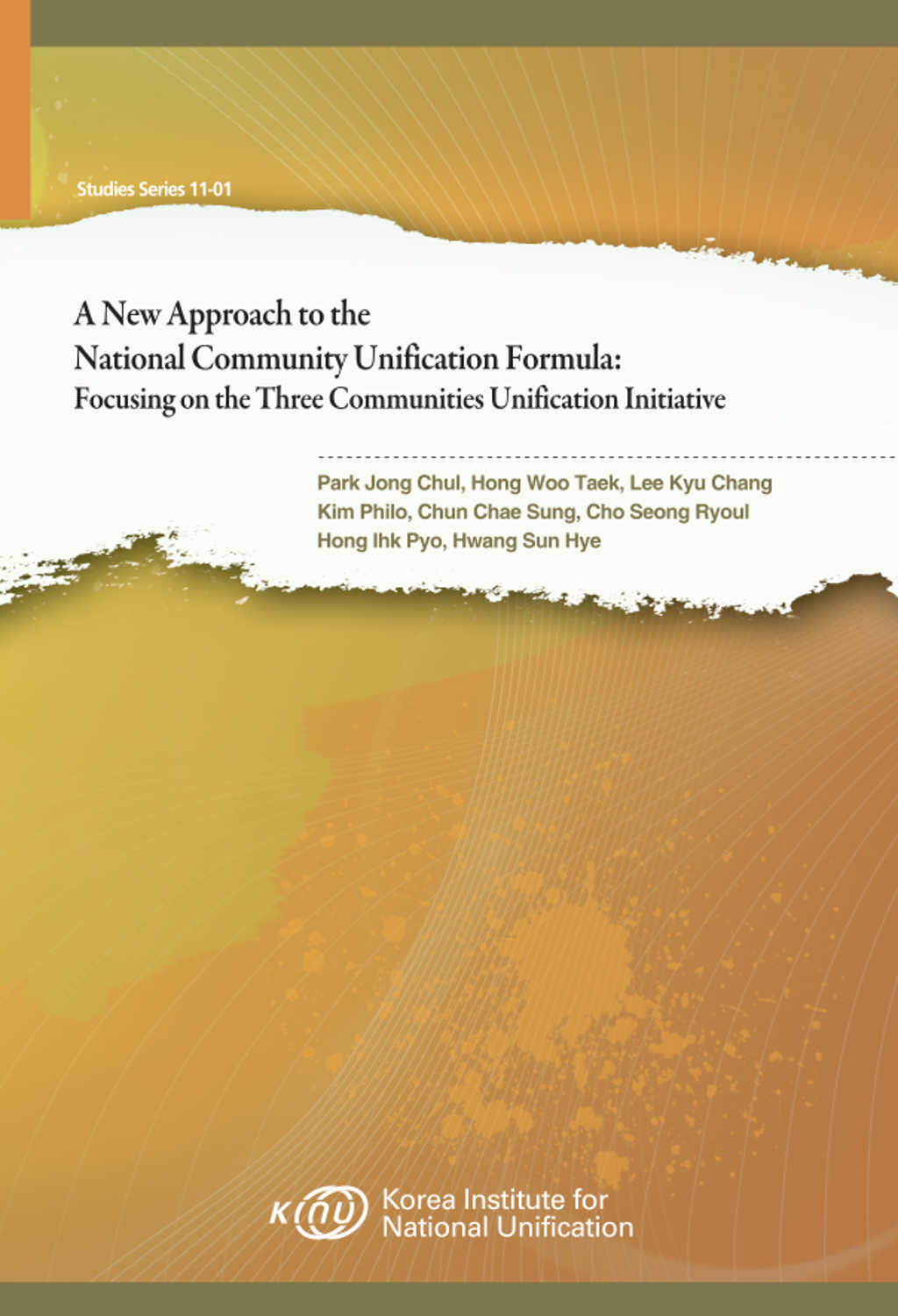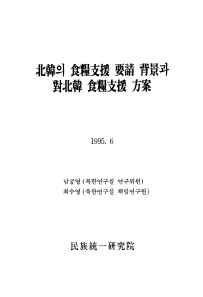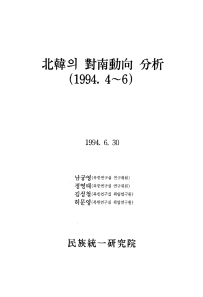
연구원발간물Studies Series 2011-01
A New Approach to the National Community Unification Formula: Focusing on the Three Communities Unification Initiative
- 개인저자
- Park Jong Chul, Hong Woo Taek, Lee Kyu Chang, Kim Philo, Chun Chae Sung, Cho Seong Ryoul, Hong Ihk Pyo, Hwang Sun Hye
- 발행사항
- Seoul: Korea Institute for National Unification, 2011
- 형태사항
- 54 p. ; 21cm
- 총서사항
- Studies Series
- ISBN
- 9788984796041
- 청구기호
- 000 SS11-01
소장정보
| 위치 | 등록번호 | 청구기호 / 출력 | 상태 | 반납예정일 |
|---|---|---|---|---|
이용 가능 (2) | ||||
| 1자료실 | G0013305 | 대출가능 | - | |
| 1자료실 | G0013306 | 대출가능 | - | |
이용 가능 (2)
- 등록번호
- G0013305
- 상태/반납예정일
- 대출가능
- -
- 위치/청구기호(출력)
- 1자료실
- 등록번호
- G0013306
- 상태/반납예정일
- 대출가능
- -
- 위치/청구기호(출력)
- 1자료실
책 소개
Introduction
The formula for unification via a national community that was first promoted in the late 1980s contains several problems, as described below, and requires expansive supplementation.
First, it needs to reflect more consideration of the structural changes in North Korea in the post-Cold War era. Present-day North Korea is facing serious challenges that would have been unimaginable in the late 1980s. With the downfall of the former Communist Bloc, North Korea lost the lion’s share of its diplomatic and economic support, and now due to Chairman Kim Jong-il’s health issues the regime is facing a succession crisis. Thus the regime will have to deal with economic difficulties and the political challenge of an unstable new government. In circumstances where the possibility has arisen of discussing unification with this new government, careful consideration of North Korea’s current situation is needed.
Second, while the formula for unification through a national community succeeded in increasing exchanges and cooperation between the two Koreas, there has been no real discussion of an engagement policy and particularly of structural engagement. At the time that this unification formula was put forward, the gap in national power between South and North was not as great as it is now, and the international diplomatic situation regarding North Korea has also changed dramatically. The present power gap between South and North is incomparably greater, and international views of North Korea have also evolved. In the 1990s the Clinton administration in the U.S. pursued an engagement policy with North Korea, and at the dawn of the 21st Century the North Korean regime showed strong signs of heading toward a fundamental change. Furthermore, South Korea pursued an engagement policy for 10 years under the administrations of Kim Dae-jung and Roh Moo-hyun. In view of these facts, we clearly need to consider a unification plan based on an engagement policy delineated in separate phases.
Third, the formula for unification via a national community has been considered mainly from the view of individual state actors. Considering the changing unification environment, we need a governance-based approach. In the future unification effort, important roles will be undertaken by actors from various different areas, not just the government. Therefore we must consider which roles each actor will play and how to best coordinate and guide their efforts toward the goal of unification.
Fourth, we must include considerations of the changes in South Korean society. As the post-nationalist, globalizing trend advances in South Korea, new views and approaches to the unification problem will be needed. This factor was not incorporated into the thinking behind the national community unification formula.
Fifth, international politics must be considered more directly.
In the late 1980s international politics were still largely determined by the Cold War situation. The future unification environment will have many new features such as the weakening of U.S. hegemony, the rise of China, precipitous changes in the power dynamics of Northeast Asia, a growing number of issues transcending national borders, and an international political order more strongly characterized by governance and networks due to the ongoing trends of globalization, democratization and increasing information access. We must take all of these factors into consideration in developing a new unification plan.1]
Meanwhile, changes in the international political order and domestic conditions are influencing the unification environment. First, let us consider the changes in the international political order. South Korea’s external environment and diplomatic range have seen revolutionary changes, not only from the dramatic shift to a post-Cold War international political system in the late 20th Century, but also due to the more recent worldwide trend of globalization. Border-transcending trends of integration and cooperation have grown more active due to increased economic interdependence and cultural exchanges on the regional and global levels. Integration has accelerated not just in Europe but in other regions as well, and Northeast Asia is no exception. All around the world the Cold War ended and new political and economic paradigms were established. Modern international politics continued as before, but new trends such as post- nationalist integration and global political networks began to emerge. In Northeast Asia modern power rivalries have continued, but economic interdependence has deepened, and cooperative efforts among civil society groups and between states have been rapidly expanding.
The problem is that while the Korean Peninsula continues to struggle under the same old South-North confrontation that began during the Cold War, South Korea has been evolving in pace with these rapid changes. The disconnect between South Korea’s rapid development and the unhappy situation on the peninsula is holding South Korea back as it strives for recognition as a global power.
South Korea’s national power has risen through the processes of industrialization and democratization, and the scope of its foreign policy has expanded beyond Northeast Asia to encompass the entire world. South Korea is devoting more of its capacity to diplomacy and investing more of its diplomatic resources into other regions beyond the peninsula. It has broken out of the paradigm of focusing the majority of its interest and resources on inter-Korean relations and the unification issue, as it increasingly needs to widen its foreign policy scope to take in the rest of the world. North Korea remains an important target of South Korea’s national strategy, but there are a growing number of new issues unrelated to North Korea. South Korea also faces the increasing importance of maintaining strategic relations with the four key regional powers and designing policies to address so-called “human security” issues such as the environment, terrorism, human rights, and natural disasters.
목차
Introduction
A New Approach to the National Community Unification Formula: A Vision for Unification via
Three Communities
A Step-by-Step Approach to the Three Communities
Direction of Unification Diplomacy for the Formation of the Three Communities
Conclusion




